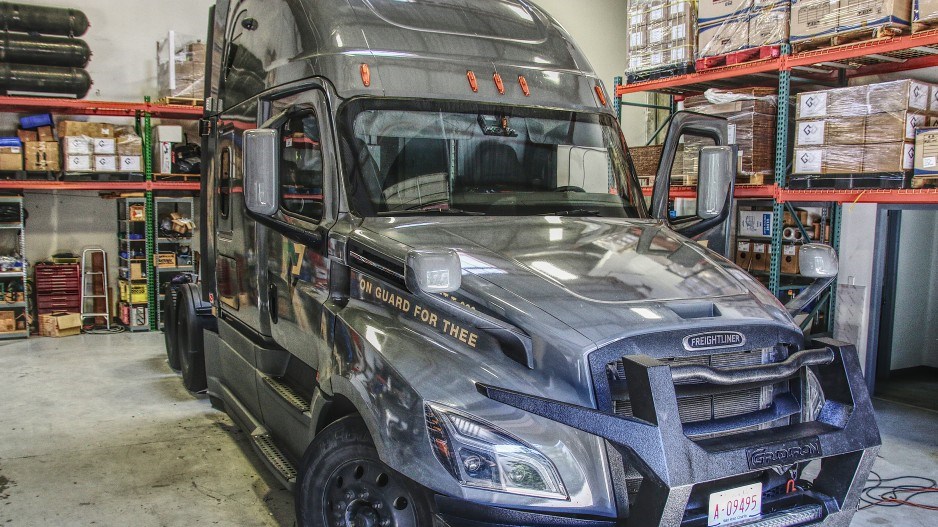Like many fleet operators, Cole Fouillard, who operates a fleet of armoured vehicles, wrangled with the question of how best to reduce his fleet’s greenhouse gas emissions.
There are several options available – battery electric, compressed natural gas, hydrogen fuel cells – all of them costly and some of them not quite ready for prime time.
Eventually, he settled on Hydra Energy’s duel-fuel system, which easily converts diesel trucks to run on both diesel and zero-emission hydrogen. On Tuesday, Fouillard and Hydra Energy CEO Jessica Verhagen unveiled the world’s first armoured vehicle to run on both diesel and hydrogen.
Hydra’s unique business model means there is no upfront cost to Fouillard’s company, Veteran Express Secure Logistics. The conversion gives the truck an instant reduction in CO2 emissions of up to 40%, and his fuel costs remain the same as what he now pays for diesel.
“I really dug deep into Hydra, and I really love their model only because it is a way we can take an existing combustion engine, and we can readily convert all of our trucks in a very short period of time,” Fouillard said.
Veteran Express has a fleet of nine armoured trucks, only one of which is currently converted. Fouillard expects to convert more of his trucks as the fuel – green hydrogen – becomes available.
“We’re really focusing on building out all of our future trucks as co-combustion trucks,” Fouillard said. “We plan on converting as many as we can, given the infrastructure and how fast that infrastructure develops.”
Veteran Express is Hydra’s second fleet customer. The first was Lodgewood Enterprises, a short- and long-haul trucking company in Prince George.
Hydrogen as low-carbon fuel is most often associated with fuel cell vehicles, which are essentially electric vehicles that generate their own electricity with hydrogen using fuel cells.
But hydrogen can also be burned, like gasoline or diesel. And because pure hydrogen contains no carbon, it produces no CO2 emissions when burned.
According to a recent survey by the Diesel Technology Forum, 76% of the approximately 15 million commercial trucks (Class 3-8) in the U.S. run on diesel. Electric makes up about 1%. The numbers are probably similar for Canada.
The up-front cost of converting a diesel or gasoline engine to something else – battery electric, fuel cells, or hydrogen fuel – can be a serious barrier to adoption. Gasoline and diesel are still the cheapest, most energy dense and most widely available transportation fuels.
Hydra’s innovation was to take a page from the Software as a service (SaaS) model to develop Hydrogen-as-a-Service, which eliminates the cost of retrofits to the truck owners.
Under this arrangement, Hydra covers all the up-front costs of converting diesel vehicles to duel-fuel systems, which includes providing the hydrogen fuel tanks, special injection system and fueling infrastructure.
In return, customers sign long-term contracts to buy hydrogen from Hydra, which is now planning to build a new electrolyzer in Prince George that will produce 3,250 kilograms of green hydrogen per day – enough to supply up to 65 trucks.
Hydra provides its fleet customers with hydrogen at a fixed price comparable to the cost of diesel. The cost of diesel includes carbon taxes and low carbon fuel standards.
Those taxes and standards don’t apply to green hydrogen. Hydra makes its profit on the margin between the price of fully taxed diesel and the price of carbon tax-free hydrogen.
“We take what we would have paid at the pump, which does include all of the different taxes, and we make the hydrogen equivalent to that, and we make our margin on that,” said Verhagen.
Apart from fuel injection systems, no major conversions are needed to diesel engines. By burning a blend of 40% hydrogen and 60%, CO2 emissions can be reduced by as much as 40%.
So why not just burn pure hydrogen to get a 100% reduction? That would require a special hydrogen combustion engine, Verhagen said. There is a limit to how much hydrogen can be burned in a conventional diesel engine before major changes to the engine are needed.
Auto makers and original equipment manufacturers are now planning to build hydrogen engines, but they are still largely in the development stage.
In addition to requiring no up-front investment for fleet operators, the addition of hydrogen, which is much cleaner burning than diesel, may reduce engine wear and tear.
“With diesel particulate buildup in the engine and on the filters and stuff – it can be a lot of downtime,” Fouillard said. “These engines are running cleaner and more efficiently with this conversion model on it.
“We’ve got no range anxiety,” he added. “If we run out of hydrogen, it goes 100% back to diesel.”
For drivers, a big concern of switching to other fuel sources is loss of power and range.
“The drivers are always a little bit surprised that the engine runs on hydrogen because it feels so similar to what they’re used to,” Verhagen said.
The average lifespan of a diesel engine is about 18 years, so few fleet operators are going to absorb the cost of retiring those trucks early, especially when alternatives, like hydrogen fuel cell trucks, as well as fueling infrastructure, aren’t yet widely available or affordable.
Hydra’s hybrid hydrogen approach provides a bridge to eventual full decarbonization, which appears to be still many years away for the trucking sector.
“There’s almost 500,000 Class A trucks registered in Canada,” Verhagen said. “They all need a solution too. No one’s going to trash all their existing trucks.”




